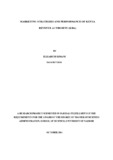| dc.description.abstract | Marketing plays a major role in building an image of a given institution and raise awareness of
products and services being offered by an institution. Kenya Revenue Authority (KRA) is the
institution responsible for tax administration in Kenya. The authority embarks on a number of
marketing strategies in order to raise awareness to the public on the payment of taxes. The
strategies that have been used include: advertisements, corporate social responsibility, public
open days, agent education forums and sensitizations in academic institutions.
These initiatives play a role in improving the image of an organization as well as its reputation,
consequently reducing costs on explicit expenses such as contractual obligations. The second
principle is on creating a good self-image that creates a better relationship between the
companies and its core stakeholders such as the customers thus inculcating trust and goodwill
which are intangible assets that enhance competitive advantage(Sun, 2010).
Kenya Revenue Authority (KRA) which was formed through an Act of parliament in 1995 is
tasked with the responsibility of tax administration in Kenya. KRA is thus a non-profit making
organization which enjoys monopoly in its field of operation. Marketing has been seen as a
preserve for profit making organization as tool that enhances competitive advantage and thus
little has been done on marketing by government nonprofit making agencies such as KRA
This study aimed at exploring the effectiveness of the various marketing strategies which are
undertaken at KRA, the success and impact of marketing on the operations of the Authority.
Further the study sought to establish the challenges that face execution of these marketing
activities and examine the modalities which can be put in place in order to enhance them not
only in KRA but in other government agencies operating in the same environment.
The study will used primary data collection techniques to gather data on the fundamental aspects
of this subject. The study employed a qualitative approach where the various variables being
studied were measured and analyzed using content analysis. | en_US |

